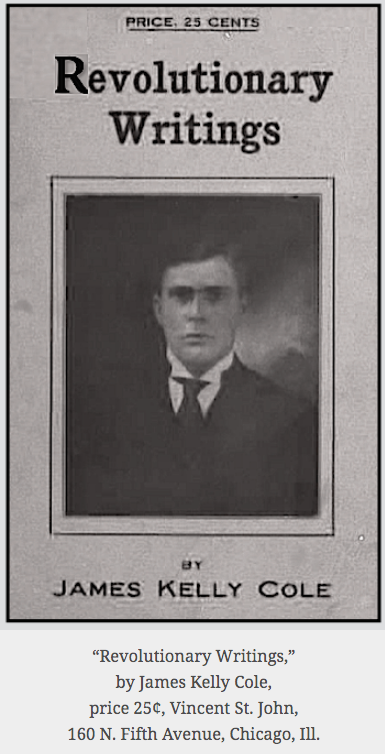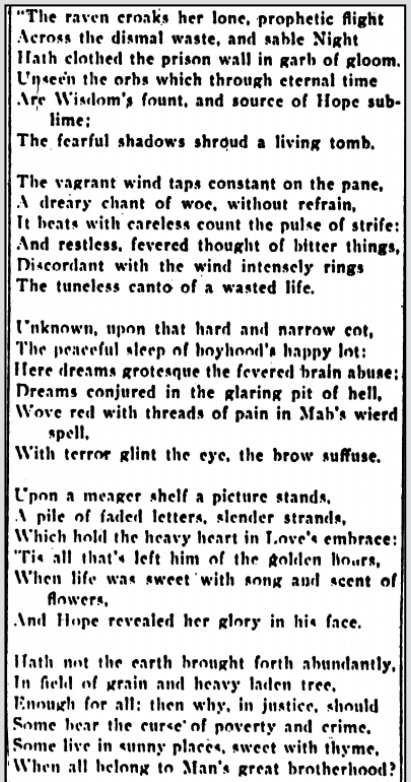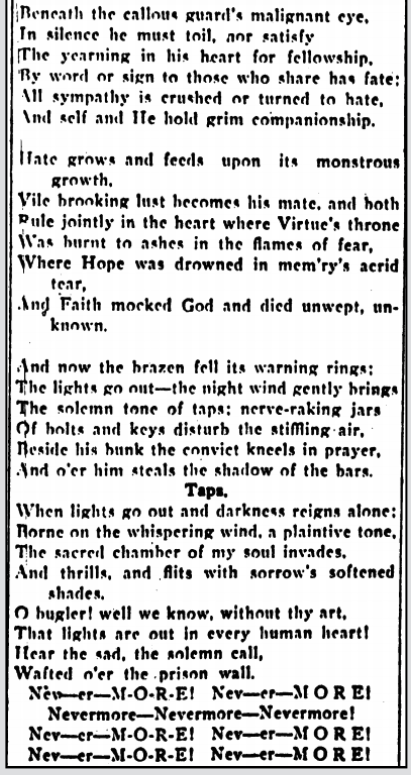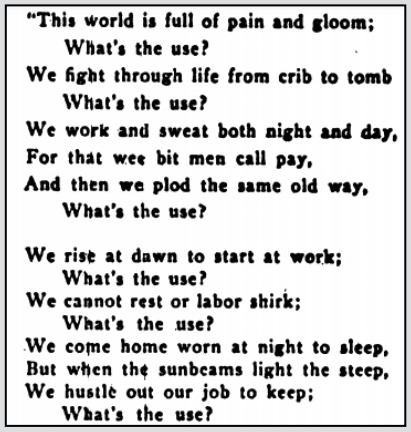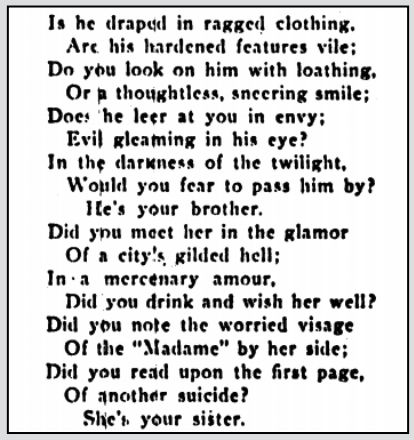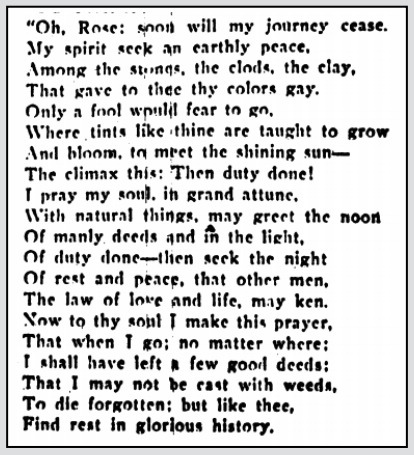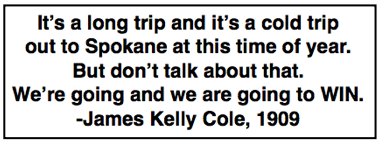 —————
—————
Hellraisers Journal – Friday June 23, 1911
Poems of James Kelly Cole, Martyr of Spokane Free Speech Fight
From the Spokane Industrial Worker of June 15, 1911:
THE LIFE WORK OF KELLY COLE
—————By Frank Bohn.
James Kelly Cole was killed in a railway accident at Tomah, Wisconsin, November 17th, 1909. He was on his way to take part in the Spokane free speech fight and was riding free.
At that time I wrote a short letter in the [New York Socialist] Call, drawing attention to the self-forgetfulness which led to the untimely death of this young comrade. To me he was simply one of many who were then fighting for freedom of speech in Spokane and elsewhere. I had not even learned his name. It is therefore a peculiar pleasure to discover that, dying in the cause, he left us something very much worth while. A little book of poems entitled “Revolutionary Writings” suggest to us the deep loss suffered by the movement when he went to his death.
His picture as well as his poems makes one regret not to have known him personally. He was a representative of a type-the type of idealistic young Americans of both sexes who are now thronging into the Socialist movement. He was fortunate in having had educational advantages. He had been a student at one of the Chicago High schools and abundant leisure during his youth afforded him opportunity for wide reading on a variety of subjects.
The most significant feature about his personality and his work was the revolutionary spirit. His intense hatred for misrule coupled with his desire for emancipation from wage slavery once led him into a tactical error. He was forced to spend more than a year in the federal prison at Leavenworth, Kansas.
The savage brutality of our prison system is suggested in a number of poems expressive of the revolutionary attitude toward this phase of our present fiendish criminal law. We regret that space will not permit us to quote “The Shadow of the Bars” in full.
“WHAT’S THE USE,” reminds us of a form used by Robert Louis Stevenson in many of his ballads. Stevenson wrote about the cedar canoe on the creek, the moon and stars shining over the Southern Pacific at Tahiti, and to the woman he loved who followed him there. James Kelly Cole in “WHAT’S THE USE” expressed the sentiment of a reading, thinking boy who is hustling for a job at hard labor:
His poems are not many, but the variety of them gives us some indication of the breadth of his human interests. There is a poem to his pipe, entitled, “AN OLD FRIEND.” Another “MY MOTHER’S GOD,” expresses the state of mind natural to the religious and patriotic American boy when first touched by Socialist thought. Probably a little later period brought forth “BROTHERS AND SISTERS.” Here he is wiser in he world’s ways. Yet the emotional element still predominates over the harsher attitude of the class conscious revolutionist. It seems to be a appeal to the whole world for pity upon human suffering:
He had been the average American boy in the average church and home. Some of his poems take us back to the simple life and joys of that home. At twenty-one he had broken in fierce rebellion against this smooth, smug, quiet life. He soon became a first class outdoor Socialist agitator. His life teemed with great hopes for the world to be and for the love of the fighting as it is. On the plains of Northern Mexico there now bleach the skeletons of scores of young American Revolutionists of this type, members of the Industrial Workers of the World and of the Socialist Party. The world at large think they are fools and two-thirds of the Socialists utterly fail to understand their passion.
James Kelly Cole sturdied hard, spoke well, wrote well and organized successfully. But for him there was one supreme means of expressing the feeling toward the world of the present. He longed with all his soul to make physical war upon it. He loved Byron dying for the liberties of Greece and John Brown going to the scaffold. He was both these curious extremes of life. The last stand of communards was to him the revolutionary reality. Then came the call. His fellow workers were suffering by hundreds in the jails of Spokane. The old rights of centuries had been denied them. Minds like his are not much troubled by doubting. In the gloom of a November evening in a western wilderness he met death in a most unromantic form.
The last of his published poems is entitled, “TO THE ROSE.” It closes with the stanza:
—————
[Photograph of book cover and emphasis added.]
~~~~~~~~~~~~~~~~~~~~
SOURCES
Quote James Kelly Cole, ISR p557, Dec 1909
“Killed on Way to Spokane”
https://play.google.com/books/reader?id=MVhIAAAAYAAJ&printsec=frontcover&pg=GBS.PA557
Industrial Worker
(Spokane, Washington)
-June 15, 1911, page 2
https://www.marxists.org/history/usa/pubs/industrialworker/iw/v3n12-w116-jun-15-1911-IW.pdf
IMAGE
Book Cover: “Revolutionary Writings” by JKC
https://archive.org/details/poemsprosewritin00cole
See also:
Hellraisers Journal – Sunday December 5, 1909
Fellow Worker James Kelly Cole Killed on the Road to Spokane
Tag: James Kelly Cole
https://weneverforget.org/tag/james-kelly-cole/
Revolutionary Writings
–Poems and Prose Writings
-by James Kelly Cole
IWW, 1910
https://archive.org/details/poemsprosewritin00cole
https://archive.org/details/poemsprosewritin00cole/page/n3
-Contents
https://archive.org/details/poemsprosewritin00cole/page/n5/mode/2up
-includes biography
https://archive.org/details/poemsprosewritin00cole/page/n7
-re his death, see page 12
https://archive.org/details/poemsprosewritin00cole/page/12
~~~~~~~~~~~~~~~~~~~~~~~~~~~~~~~~~~~~~~~~
Hobo’s Lullaby – Arlo Guthrie

